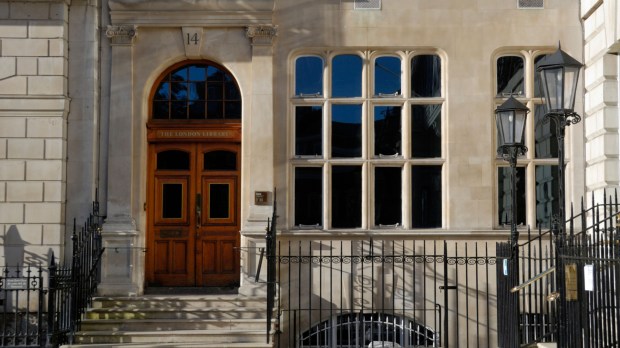The end of the Cold War was used by the victors to unite Germany. To balance this, Europhiles created a single currency which, by replacing the deutschmark, would ‘hold Germany down’. The reverse occurred. The euro made Germany the most important power in the European Union, and so it remains. Today, the same Europhiles want to use the rebirth of the Cold War to encourage Germany to re-arm. To balance this, they want to create a truly ‘European’ defence, of which Germany would be a vital part. The EU would prevent Germany from using its force for national needs. For this purpose, they say, Nato would be no good because it is intergovernmental. This too seems a recipe for trouble, because the Nato alliance and a genuinely centralised European armed forces could not co-exist. Inside such a European defence arrangement, there would a struggle for mastery between Germany and France, producing disunited command. I know Putin hates the EU, but its latest dream, if it came true, would give him a massive advantage in any future wars he might wish to prosecute.
In the Sunday Times, Professor Lawrence Freedman, analysing the Ukrainian situation, writes: ‘It is foolish to set as a war aim one you cannot be sure of achieving.’ Really? Surely the nature of war makes this impossible. ‘I have set my life upon a cast,’ says Richard III, ‘And I will stand the hazard of the die.’ Sir Lawrence is the official historian of the Falklands war, so he must know that no one could be sure of achieving Britain’s war aim of recapturing the islands. What is true is that thinking you can be sure of achieving your aim is a bad idea: look at Argentina in 1982, or Vladimir Putin in his attempt to decapitate the Kyiv regime in 72 hours. In the latter’s case, I fear he is learning his lesson fast.
Mrs Justice Thornton (also known as Mrs Ed Miliband) last week surprised and pleased those of us who had opposed Victoria Tower Gardens as the site for the Holocaust Memorial. In the High Court, she found that the plan went against the London County Council (Improvements) Act of 1900. She refused permission to appeal. It was clear to her that the planners had not paid enough attention to the heritage aspects, especially to what would happen as a result to the Buxton Memorial to the abolition of slavery, already in the gardens. With 7,000 people a day expected to enter the small park to view the Holocaust Memorial, she accepted the argument that it could no longer be ‘a peaceful breathing space’. This is a victory for local residents, lovers of green space and the many Jews and gentiles who want a memorial but feel that this was too much a grand projet and too little a serious commemoration. The Imperial War Museum, for example, would provide a better home and opportunity to study. Some of us also felt that, being next to parliament, the centre could be used to trivialise the Holocaust – a photo-opportunity backcloth against which dignitaries would condemn the world’s latest atrocities as genocide or grandstand about immigration. The truth is that real genocide is a mercifully rare event. What happened in 1941-45 is unique and should be treated as such.
My sister backed Noble Yeats for the Grand National at 66-1 purely on the strength of his name. His sire was the famous Yeats, four times winner of the Ascot Gold Cup. His dam was That’s Moyne (out of It’s Mine), and Moyne is a baronial title, so that may explain the name. Even if it doesn’t, it is fitting for a great racehorse. Yeats understood equestrian nobility. Here he is ‘At Galway Races’, where the horses, the riders and the crowd have the zest that once existed in the theatre: ‘There where the course is,/Delight makes all of the one mind,/ The riders upon the galloping horses,/ The crowd that closes in behind:/ We, too, had good attendance once,/ Hearers and hearteners of the work;/ Aye, horsemen for companions,/ Before the merchant and the clerk/ Breathed on the world with timid breath.’ It particularly suits Sam Waley-Cohen, a great amateur.
Charles Tyrwhitt, the shirt-maker, is an impressive business and I am a customer. But I feel a bit depressed by its fashion ads currently on the Tube which announce ‘No more rules’. Post-Covid, it seems, we must all wear whatever we like. This is an unsettling principle. The heresy is to think that clothes are a matter only for the person wearing them. No, they are a social construct. They are supposed to impress, calm, respect, please, entice etc other people and to express norms about what is appropriate when and on whom. For this, rules arise. It can be fun to break them, but to deny them is to reduce clothes to mere function and convenience and make almost everyone look dowdy, which is what has happened. Confusingly, and at the other extreme, the slogan on the window of Tyrwhitt’s shop in Jermyn Street says ‘One chino to rule them all’, almost as if there is a totalitarian People’s Republic of Chino which we must all obey.
This week the Gospel accounts of the Passion are read. It would be presumptuous to say which is ‘better’, but there is something peculiarly fascinating about John’s. He expresses the mind of Pilate and thus the contrast between worldly authority and the authority of Jesus. All four Gospels record the superscription on the cross, but only John gives its full version ‘JESUS OF NAZARETH KING OF THE JEWS’, and only he identifies Pilate as writing it. The chief priests object: he should have written that ‘he [Jesus] said, I am the King of the Jews’, but Pilate replies, ‘What I have written I have written’. Was he mocking the priests, or did he half-recognise the truth about the man he had wrongly condemned to death? John does not say. It is one of the most pregnant sentences in all literature.
Got something to add? Join the discussion and comment below.
Get 10 issues for just $10
Subscribe to The Spectator Australia today for the next 10 magazine issues, plus full online access, for just $10.
You might disagree with half of it, but you’ll enjoy reading all of it. Try your first month for free, then just $2 a week for the remainder of your first year.















Comments
Don't miss out
Join the conversation with other Spectator Australia readers. Subscribe to leave a comment.
SUBSCRIBEAlready a subscriber? Log in